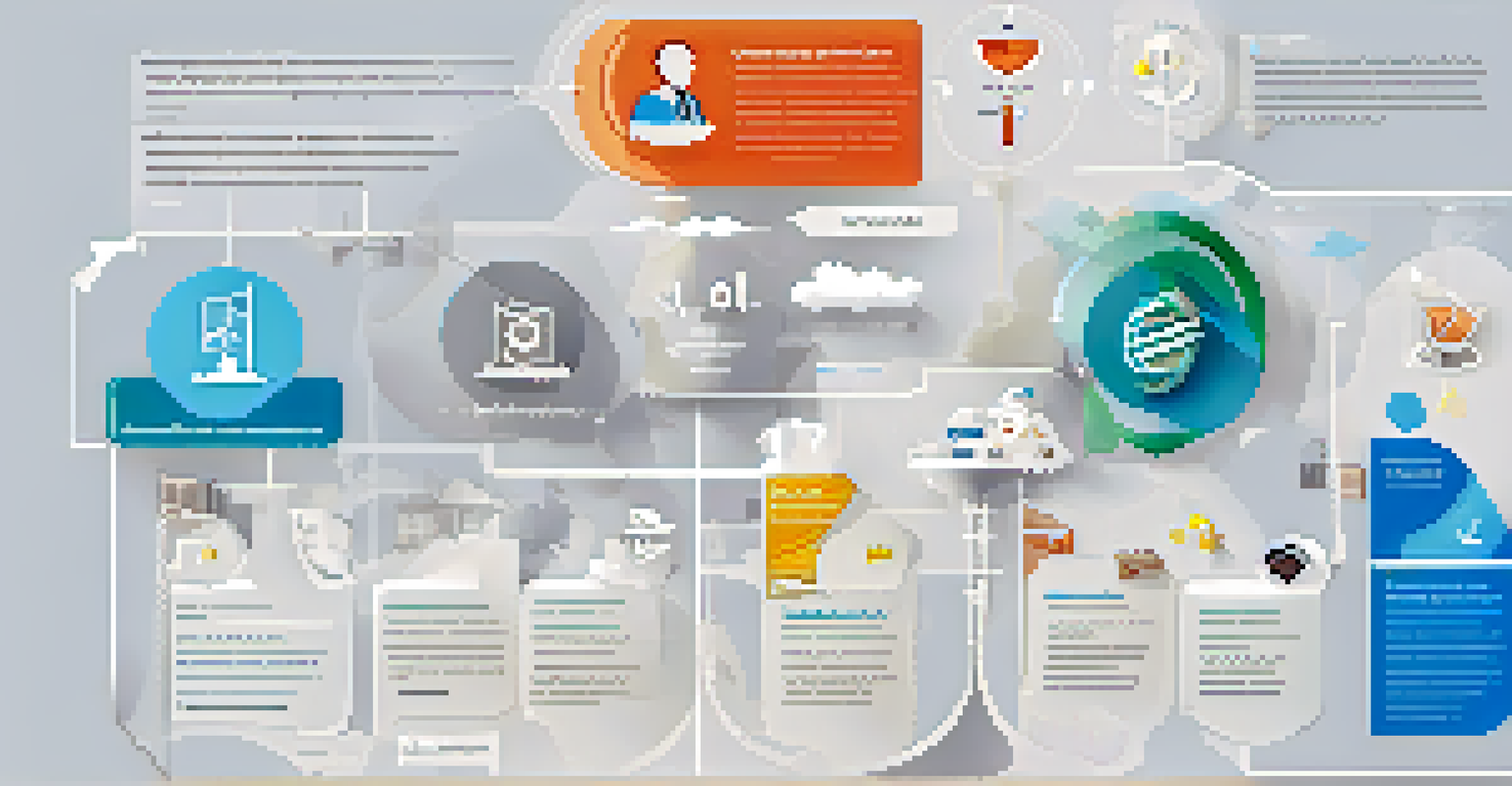The Evolution of Business Ethics: Past, Present, and Future

Understanding Business Ethics: What It Means Today
Business ethics refers to the principles and standards guiding behavior in the world of commerce. It encompasses a wide range of issues, from corporate governance to social responsibility. Today, these ethics are not just about legality; they also reflect societal values and expectations.
Business ethics is not a static concept; it evolves with society's expectations and the moral standards of the time.
For instance, consumers today are more educated and demand transparency from brands. A company's ethical stance can significantly influence its reputation and customer loyalty. Thus, understanding business ethics is crucial for any organization aiming to thrive in the modern marketplace.
In essence, business ethics is about fostering trust and integrity in relationships, whether with customers, employees, or the community. It sets the foundation for long-term success and sustainability, making it a vital aspect of contemporary business practices.
A Look Back: The Historical Roots of Business Ethics
The origins of business ethics can be traced back to ancient civilizations, where trade was often governed by moral codes. For example, the Code of Hammurabi included guidelines for fair trade practices. These early regulations highlighted the importance of honesty and fairness in business dealings.

As commerce evolved, so did the expectations of ethical conduct. The Industrial Revolution brought about significant changes, raising questions about labor practices and corporate responsibility. Think about the child labor controversies of the 19th century—these issues sparked movements that laid the groundwork for modern business ethics.
Business Ethics Drive Trust Today
Understanding and implementing business ethics is crucial for building trust and fostering long-term success in today's marketplace.
By the mid-20th century, the concept of corporate social responsibility (CSR) began to gain traction. Companies were increasingly held accountable for their social and environmental impacts, marking a significant shift in how ethics were perceived in business.
The Modern Era: Business Ethics in the 21st Century
In today's fast-paced digital world, business ethics has taken on new dimensions. Issues like data privacy, sustainability, and diversity have become paramount. Companies are expected to not just comply with laws but to actively promote ethical practices within their operations.
In the long run, the sharpest weapon of all is a kind and gentle spirit.
For example, the rise of social media has amplified consumer voices, making it easier for individuals to hold companies accountable for unethical behavior. This shift has led many businesses to adopt more robust ethical frameworks, emphasizing transparency and stakeholder engagement.
Moreover, the COVID-19 pandemic highlighted the need for ethical leadership, as companies navigated complex challenges while prioritizing the well-being of their employees and communities. This focus on ethical decision-making is critical for fostering resilience and trust.
Key Ethical Theories Shaping Business Practices Today
Several ethical theories influence modern business practices, including utilitarianism, deontology, and virtue ethics. Utilitarianism suggests that actions should promote the greatest good for the greatest number, often guiding corporate decision-making.
Deontology, on the other hand, emphasizes the importance of duty and rules, advocating for adherence to ethical principles regardless of the consequences. This theory can be seen in companies that prioritize ethical sourcing and labor practices, even if it affects profitability.
Technology Shapes Ethical Practices
The rise of technology presents both opportunities and challenges in business ethics, particularly regarding data privacy and transparency.
Lastly, virtue ethics focuses on the character and integrity of individuals within organizations. Businesses that cultivate a culture of ethical behavior encourage employees to act with honesty and respect, fostering a positive work environment and enhancing their brand reputation.
The Role of Technology in Business Ethics
Technology has revolutionized the landscape of business ethics, presenting both opportunities and challenges. With the rise of big data and artificial intelligence, companies can now analyze consumer behavior and preferences like never before. However, this power also raises ethical concerns regarding privacy and data security.
Moreover, technology enables greater transparency, allowing consumers to easily access information about a company's practices. For instance, blockchain technology can enhance supply chain transparency, ensuring ethical sourcing and production.
Conversely, the misuse of technology can lead to unethical practices, such as exploitation or discrimination in algorithmic decision-making. As businesses continue to embrace innovation, navigating these ethical dilemmas will be crucial for maintaining trust.
Challenges in Upholding Business Ethics Today
Despite the increasing focus on business ethics, companies face numerous challenges in upholding these principles. One significant issue is the pressure to prioritize profits over ethical considerations, which can lead to compromises in integrity. This dilemma often pits short-term gains against long-term sustainability.
Additionally, the global nature of business today complicates ethical practices. Companies operating in multiple countries must navigate diverse cultural norms and legal frameworks, which can create ethical gray areas. For instance, what is considered acceptable in one country may be viewed as unethical in another.
Future Demands Ethical Commitment
As societal values evolve, businesses will need to integrate ethical considerations into their strategies to remain competitive and responsible.
Furthermore, the rapid pace of change in technology and society creates a constantly evolving ethical landscape. Businesses must remain agile and proactive in addressing emerging ethical issues to maintain their credibility and foster stakeholder trust.
Looking Ahead: The Future of Business Ethics
As we look to the future, the role of business ethics is likely to expand even further. With growing awareness of social and environmental issues, consumers will increasingly demand that companies take a stand on these matters. Businesses that prioritize ethical practices will likely gain a competitive edge in the marketplace.
Moreover, the integration of ethics into corporate strategy will become essential. Companies that embed ethical considerations into their decision-making processes will not only attract customers but also foster employee loyalty and engagement. This holistic approach to business ethics is crucial for sustainable growth.

Ultimately, the future of business ethics will require a commitment to continuous learning and adaptation. As societal values evolve, so too must the ethical frameworks that guide businesses, ensuring that they remain relevant, responsible, and resilient.